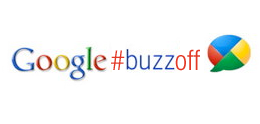#BuzzOff: 10 reasons to turn Google Buzz off

On February 9th Google have unvailed Google Buzz, a service that involuntarily transforms every Gmail user’s private contact list into a public social network. While Google has suffered from privacy concerns in the past, Buzz is considered by many angry users to be crossing a line. Many loyal Google users including myself have hence chosen to disable the service. I present a list of reasons why you and your contact list should do that too.
1. Choice: We never asked for it
First and foremost we have never asked for Buzz, we have never signed an agreement to enable it and we don’t necessarily want it. Even without all of the many other reasons, this should be enough. Many of us are already oversaturated with social media and Buzz just creates more noise. The fact it is coupled with Gmail makes it harder to resist the temptation to waste even more time on depressing filtering of meaningless contextless chatter.
2. Privacy: Our private and public contacts are not the same
An abused women workplace and new partner exposed to her abusive ex; doctors’ confidential client list shared with the world; journalists’ sources automatically revealed; Iranian and Chinese activists networks mapped for their governments to easily track; your own private contacts, private no more. When asked by CNBC if users should trust Google as a friend the company’s CEO Eric Schmidt answered:
“If you have something that you don’t want anyone to know, maybe you shouldn’t be doing it in the first place.”
I don’t know if this is the excuse he was also making internally at Google in their privacy debates over Buzz which they most certainly have had before giving the green light for this bold move. Schmidt and Google are not vindicated by the fact Facebook has been compromising its own users’ privacy and that its founder Mark Zuckerberg have been making similarly miserable statements. In response to Zuckerberg social media researcher and lead thinker on the issues around the online public/private danah boyd says:
“Privacy isn’t a technological binary that you turn off and on. Privacy is about having control of a situation.It’s about controlling what information flows where and adjusting measures of trust when things flow in unexpected ways.”
The same applies to Google. This time, it was even more “unexpected” as it simply happened.
3. Context: Who you interact with on different services is different for a reason
“By offering social communications, which have primarily been used for entertainment purposes, Buzz would bridge the gap between work and leisure.”
Google co-founder Sergey Brin on Google Buzz, quoted by the New York Times
Why would we want to do that? There are very good reasons for us to keep different contacts on different service. In fact, one of the most often complains people have about Facebook is that its popularity has ruined it. Once both my clients, my students, my colleagues, my kindergarten friends, my boss, my grandma and some hundred other people who claim they know me all “friend” me on Facebook the platform immidiately loses its social context. Would you invite all of your facebook friends to one party? Would you want to tell all of them the same thing in the same way? Yeah… me neither. Now ask yourself the same question about anyone you’ve ever emailed with on Gmail, including all the people you email with and you just can’t stand. E-mail gives us control over the contexts and tones of our different relationships and that’s its key feature. That’s something Buzz is ignoring by turning our email contact list to a social network.
We switch between different social networks all the time, we manage different social graphs (social structures) and manage different aspects of their identities in different ways on any of them. That’s exactly why we develop work relationship around our LinkdIn contacts and leisure relationships around our YouTube contacts. No Sergey, we don’t want you to bridge this for us and I wish I could add “…thanks for asking”, but you didn’t! Continue reading “#BuzzOff: 10 reasons to turn Google Buzz off”
